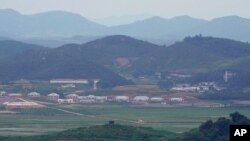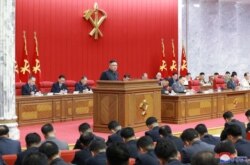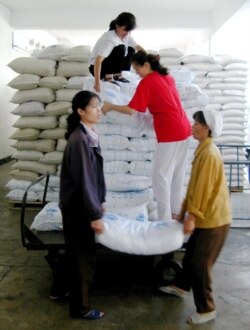북한 정권이 연일 식량난을 호소하고 국제기구들이 이를 뒷받침하는 보고서를 잇달아 발표하면서 식량 지원 필요성에 대한 논의가 활발합니다. ‘코로나19 사태’와 저조한 작황이 겹친 데 대한 우려가 많지만, 지원 조건과 관련해선 경제 전문가와 안보 전문가 사이에 인식차가 엿보입니다. 자국민의 고통을 이용해 제재 완화를 모색하려는 정권의 의도는 차단해야 한다는 지적도 나왔습니다. 백성원 기자가 보도합니다.
만성적인 식량난으로 고통받는 북한인들을 국제사회가 도와야 한다는 인도주의적 원칙에 이의를 제기하는 목소리는 듣기 어렵습니다. ‘정치적 올바름’을 고려해야 하는 민감한 사안이기도 하지만, 무엇보다 생명을 살리는 윤리의 영역이자 인권이라는 기본 가치와 직결되기 때문입니다.
북한경제 전문가인 오스트리아 빈대학교의 루디거 프랭크 교수는 VOA에 “어려운 시기를 보내고 있는 북한인들을 돕는 식량 지원을 지지하지 않을 수 없다”며 “지원 식량이 해외로 되팔리지 않는 한, 북한인들이 이를 섭취할 것은 분명하다”고 말했습니다.
[루디거 프랭크 교수] “Food aid helps the North Korean people who are having a difficult time, and thus I do not see how we can not support it…As long as it can be ensured that this food is not being resold abroad, we can be certain that it will be eaten by North Koreans.”
전문가들은 특히 단기적 식량 지원은 대규모 현금과 기술 제공이 수반되는 장기적 개발 지원과 달리 취약계층의 즉각적인 위기를 해소하기 위한 일종의 ‘구명조끼’라는 점을 강조했습니다.
랜드연구소 선임 경제학자 크리시나 쿠마르 박사는 “기근과 전염병 대유행, 홍수나 지진 같은 자연재해 피해자에게 제공하는 인도적 지원과 국가 발전을 돕는 장기적 원조를 구분할 필요가 있다”고 말했습니다. 그러면서 “북한에선 코비드-19와 국경 봉쇄, 식량 가격 급등으로 인해 굶어 죽는 사례가 보도되는 만큼, 유엔의 원조는 생명을 구하는 목적의 인도적 지원 범주에 들어간다”고 설명했습니다.
[크리시나 쿠마르 박사] “When it comes to aid / foreign assistance, it is helpful to distinguish between humanitarian assistance that is given to help people during famines, pandemics, and natural disasters such as floods and earthquakes and long-term assistance that is given to help in the development of the country. The humanitarian assistance is typically not controversial because it is aimed at saving lives. There are reports of death due to starvation in North Korea due to COVID-19 and related border closings, and food inflation has skyrocketed. It appears that the above assistance by the UN to North Korea falls under this category.”
대북 식량 지원의 필요성은 북한 스스로 극심한 식량난을 호소하고, 여러 국제기구도 북한 주민들의 식량 안보 취약성을 우려하는 보고서를 잇달아 발표하면서 더욱 부각되고 있습니다.
앞서 북한이 지난 13일 유엔 고위급 정치포럼(HLPF)에서 발표한 ‘자발적 국가별 검토(VNR)’ 보고서에는 곡물 생산계획에 차질을 빚고 있으며, 백신 등 필수 의약품 부족에 시달리고 있다고 인정하는 내용 등이 담겼습니다. 같은 날 식량농업기구(FAO) 등 국제기구들은 공동 보고서에서 북한 주민의 42.4%가 영양 부족 상태에 시달린다며, 북한을 외부 식량 지원이 필요한 국가로 재지정했습니다.
캘리포니아주립 샌디에이고 대학의 스테판 해거드 교수는 “대북 인도적 지원을 지지한다”며 “지난해 350만 명에 500만 달러가 배정됐다면 1인당 1달러가 살짝 넘는 수준으로 대북지원에 대한 (공여국의) 피로 현상(aid fatigue) 때문에 지원 금액이 상당히 적다”고 설명했습니다. 유엔 중앙긴급구호기금(CEFR)이 지난달 발표한 ‘2020 연례결과보고서’를 인용한 설명입니다.
[스테판 해거드 교수] “I support necessary humanitarian assistance; as you can see, it is quite small as North Korea has seen substantial aid fatigue. Note that at $5m last year earmarked to 3.5 m people is a little over a dollar per person. Aid amounts are small.”
문제는 투명한 분배와 감시에 대한 오랜 불신입니다. 유엔 기구들이 긴급 대북 식량 지원을 호소하고 있지만 반응이 냉랭한 이유이기도 합니다.
데이비드 맥스웰 민주주의수호재단(FDD) 연구원은 “대북 식량 지원을 지지한다”면서 “다만, 투명성을 보장해 국제사회가 식량 분배 과정을 추적할 수 있고, 지원이 군부 등 정권에 의해 전용되는 대신 가장 빈곤한 사람들에게 돌아가도록 보장돼야 한다”고 강조했습니다.
[녹취: 데이비드 맥스웰 FDD 선임연구원] “I do support food aid for the Korean people in the North. However, it must be provided with transparency, and the regime must allow the international community to provide food aid with the ability to track it, and to ensure that it gets to the neediest people, and is not diverted for use by the regime and especially by the military. So, I'm supportive of food aid if North Korea requested it but it has to be done correctly. Otherwise, it just goes to support the regime.”
맥스웰 연구원은 외부 지원을 반대하는 탈북민들과의 대화를 소개하며 “식량이 주민들에게 전달된다 해도 국제사회의 구호품이 아닌 김정은의 선물로 인식되기 때문에 여전히 정권에 혜택이 돌아간다고 생각하는 사람이 많다”고 설명했습니다.
[녹취: 데이비드 맥스웰 FDD 선임연구원] “I've talked to many escapees from the North, who do not think that food aid should be provided. They really cite two reasons. One is that the same one we all know that it will be diverted for the use of the regime, but second is if it is provided to the Korean people in the North, if they are the people who do receive it, it will be provided to them with the understanding that this is a gift from Kim Jong Un, and it will not acknowledge the receipt from the international community. And so escapees will say that even if the food aid gets to the people who need it, it will still be benefiting the regime.”
실제로 전 노동당 39호실 고위 간부를 지낸 리정호 씨는 지난 2월 VOA와의 인터뷰에서 “지방 출장을 다니면서 지원 물자가 전용되는 정황을 여러 차례 목격했다”고 말했습니다.
[녹취: 리정호 씨] “나는 북한에서 인도주의 지원으로 들어온 식량을 빼돌리는 현장을 여러 번 목격 했습니다. 북한 당국은 모니터링하는 국제감시단이 있으면 지원받은 식량을 주민들에게 공급하고 그 감시단이 떠나면 군대 차량을 동원해 다시 실어 가는 기가 막힌 행동을 합니다. 그때 주민들은 식량을 주었다가 빼앗아 간다고 뒤에서 욕하고 난리를 쳤습니다. 또 한번은 원산항에서 군대 차량 수십 대가 군용번호판을 지우고 일반 사회 차량인 것처럼 위장해 배에서 내리는 인도주의 지원 식량을 바로 군대로 실어 가는 것을 보았습니다. 그때는 왜 군대 차들이 번호판을 지우는지 이해하지 못하였습니다. 그런데 지금에 와서 보니까 국제사회가 북한 군대에는 식량 지원을 못 하게 돼 있는 것 같습니다.”
루디거 프랭크 교수는 “투명성은 모든 과정에서 핵심이 돼야 한다”며 “이는 합리적인 요건이고, 장기적 협력의 근간이 되는 신뢰 구축에 도움이 된다”고 말했습니다. 그러면서 “북한이나 어떤 다른 나라도 이런 원칙에서 예외가 될 수 없다”고 덧붙였습니다.
[루디거 프랭크 교수] “Transparency must be a core characteristic of any transaction; it is a reasonable requirement and helps building trust, which is the foundation for long-term cooperation. I do not think that making exceptions for North Korea or any other country is a good idea.”
크리시나 쿠마르 박사도 “공여국들은 빈곤 퇴치와 사회경제개발에서 동기를 얻고 소수 엘리트 계층이 아닌 주민 다수에게 혜택이 돌아가기 바라는 만큼, 지원 과정에서 투명성을 신경 쓰는 것이 언제나 바람직하다”고 밝혔습니다.
[크리시나 쿠마르 박사] “It is always good to be concerned about transparency while giving aid, since donor countries are motivated by eradication of poverty and socioeconomic development and want the people at large in the receiving country to benefit, and avoid "elite capture." There has been a move to make longer term assistance "conditional" on policy reform by the receiving countries, but this option also is fiercely debated as some have argued that such reforms (such as fiscal tightening) affect the poorest people the most. Evidence again seems to be mixed, and local institutional quality might matter.”
미국 정부의 대북 지원 사업에 관여했던 미첼 리스 전 국무부 정책기획실장은 조지 W 행정부 당시 자신이 국무부에서 제안했던 방안을 소개하면서 “북한에 타당한 지원 필요성이 있는지, 다른 나라보다 필요 상황이 더 심각한지, 지원이 가장 필요한 사람들에게 확실히 전달되는지를 대북 지원의 세가지 기준으로 삼아야 한다”고 밝혔습니다. 그러면서 “이 질문에 대한 답변이 모두 ‘그렇다’라면 대북 인도적 지원에 찬성한다”고 말했습니다.
[미첼 리스 전 국무부 정책기획실장] “There are three benchmarks for giving humanitarian aid to North Korea: Is there a legitimate need for aid? Because aid is limited globally—not all needs can be met, unfortunately, as there is only so much assistance to go around—is the need in North Korea more serious than in other countries? Are we confident that any aid we give North Korea will go to those who most need it? If the answer to all three questions is “yes,” then I am in favor of delivering humanitarian aid to North Korea. And this was the case I made when I was at the State Department during the George W. Bush Administration.”
다만, 공정하고 투명한 분배 원칙을 제시한 전문가 중 일부는 열악한 곡물 생산 실태와 코로나바이러스 감염증 확산이 맞물린 극도의 위기 상황에서 북한에 너무 높은 조건을 요구하기보다 생명을 살리는 것이 우선이라며 ‘융통성’을 주문하기도 했습니다.
프랭크 교수는 “심지어 지원 식량이 누구에게 돌아가는지도 그렇게 중요하지 않다”며 “‘그럴 자격이 없는’ 사람들이 지원 식량을 섭취한다 해도, 국내 생산 식량이 더 많은 주민에게 제공될 수 있기 때문”이라고 설명했습니다.
[루디거 프랭크 교수] “It does not even matter by whom exactly; if someone whom we classify as "non-deserving" ends up eating food aid, then more of the domestically produced food is available for others.”
쿠마르 박사는 “코비드-19 상황에서 즉각적인 인도주의 지원을 위해 극빈자들에게 직접적인 지출을 하는 것은 생명을 살리는 데 매우 중요하다”고 강조했습니다.
[크리시나 쿠마르 박사] “For immediate humanitarian assistance such as during COVID-19, direct disbursement to the neediest is again critical to save lives. There have been reports that the North Korean regime is cracking down on corruption among elites; Kim Jong-un has admitted that the country is in dire economic straits and has mentioned a second "arduous march;" and UN presence to distribute food aid directly, could all hopefully ensure much needed food reaches those who are starving.”
이어 “보도에 따르면 북한 정권은 엘리트 계층의 부패 근절에 나섰고, 김정은은 북한의 열악한 경제 상황을 인정하면서 제2의 ‘고난의 행군’을 언급했으며, 유엔은 식량의 직접 분배를 위해 현지에 주둔하고 있는 만큼, 크게 필요한 식량이 굶주린 이들에게 반드시 전달될 수 있기 바란다”고 말했습니다.
쿠마르 박사는 “전 세계에서 전염병이 계속 기승을 부리고 있어 북한뿐 아니라 모든 나라가 특별히 어려운 시기에 있다는 사실이 정상 참작 사유가 될 수 있다”며 “백신 지원을 포함한 인도적 지원이 꼭 필요한 시간이 있다면 지금이 바로 그때”라고 말했습니다.
[크리시나 쿠마르 박사] “One mitigating circumstance of this argument now is that we are living in uniquely challenging times. Not just North Korea, but the whole world, as the pandemic continues to rage in much of the world. If there was ever a time for humanitarian assistance for countries, including vaccine assistance, this is it.”
대북 식량 지원이 국가배급체계를 강화하고 장마당을 위축 시켜 시장경제 발전을 오히려 방해한다는 지적과 관련해선, 타당한 분석이지만 ‘먹을 권리’가 정치보다 앞서는 만큼, 현실에 그대로 적용하기엔 무리가 있다는 반응이 많았습니다.
프랭크 교수는 “매우 냉소적인 견해에 근거를 둔 그런 주장에 동의하지 않는다”며 “이는 북한 주민들이 충분히 고통받고 충분히 사망하면 정권을 바꿀 것이라는 주장”이라고 반박했습니다.
[루디거 프랭크 교수] “This argument is based on a very cynical view that I do not share: that if the North Korean people suffer enough, if enough of them die, then they will change their regime.”
이어 “동독 시민 출신으로 덧붙이자면, 독일 통일 이전 서독의 가치와 높은 도덕적 기준은 나 자신과 주변 사람들에게 강한 영향을 미쳤다”며 “이는 오늘날 서독 출신 사람들은 잘 알지 못하는 힘이지만 중요하고 효과적”이라고 평가했습니다. 따라서 “이를 가볍게 포기해선 안 된다”며 “북한과 그 밖의 지역에서 변화를 촉진하는 최선의 길은 매력적인 대안을 제공하는 것”이라고 강조했습니다.
[루디거 프랭크 교수] “Let me add that as a former citizen of East Germany, before unification the values and high ethical standards of the West always had a strong effect on me and people around me. This is a strength that many in the West today are not aware of, but it is important and effective. We should not give it up lightly; the best way to promote change, in North Korea and elsewhere, is by offering an attractive alternative.”
해거드 교수는 “인도적 지원은 장기적으로 볼 때 계속 감소해왔고 금액 역시 적은 만큼, 내부 변화를 막는 요소가 될 위험은 없다”고 내다봤습니다.
[스테판 해거드 교수] “Humanitarian aid has fallen over the long run, and the amounts are small; I don’t see them as posing these sorts of risks.”
미첼 리스 전 국무부 정책기획실장은 “‘굶주린 아이는 정치를 모른다’는 레이건 대통령의 말처럼, 정권을 변화시키기 위해 의도적으로 누군가를 굶기는 것은 윤리적인 정책 제안이 아니다”라며 식량 지원을 내부 개혁의 걸림돌로 보는 비판은 수용할 수 없다는 입장을 밝혔습니다.
[미첼 리스 전 국무부 정책기획실장] “As President Reagan once said, a starving child knows no politics. That answers the question, for me, of intentionally starving people in the hope that their government will make changes. That is not an ethical policy recommendation.”
한편, 워싱턴의 안보 전문가들은 북한의 극심한 식량난과 지원 필요성에 적극 공감하면서도, 북한 정권이 자국민의 고통을 정치적으로 이용하고 있다고 비판했습니다. 북한 주민에 대한 효과적인 구호 방안을 진지하게 모색하되, 열악한 식량 사정과 민생문제를 연일 외부에 공개하는 북한 정권의 의도만큼은 간파해야 한다는 지적입니다.
맥스웰 연구원은 “북한인들이 식량 부족으로 고통받고 있는 상황을 매우 심각하게 받아들여야 한다”면서도 “북한이 각종 매체를 통해 이 문제를 계속 공개하는 것은 핵 협상 재개의 조건으로 제재 완화를 요구하려는 의도”라고 진단했습니다.
[녹취: 데이비드 맥스웰 FDD 선임연구원] “All the evidence that we have seen from the World Food Program and other indications that the people in the North are suffering from food shortages—I think that's very important that we take it seriously. However, we must not be taken in by North Korean rhetoric, and I think its continued reporting on the problem is part of its campaign to make the demand for sanctions relief, in response for a promise to talk to conduct nuclear negotiations. The short term goal for the regime is to get sanctions relief.”
또한 이런 행동은 “동정을 얻고 국제사회를 부끄럽게 만들어 후속 조치를 끌어내려는 새로운 형태의 ‘협박외교(blackmail diplomacy)’”라고 진단했습니다. “국제사회가 요구하는 투명성과 공정한 분배 조건을 받아들일 수 없는 김정은은 직접적인 식량 지원을 바라는 게 아니라 제재 완화를 받아내려는 수단으로 북한인들의 고통을 이용하고 있다”는 비판입니다.
[녹취: 데이비드 맥스웰 FDD 선임연구원] “This is really another line of effort as part of his blackmail diplomacy…But this line of effort is about trying to gain sympathy and really almost shame the international community into doing something. He doesn't really want direct food aid because he can't accept it with the requirements that the international community puts on it for transparency, and to ensure that it gets to the people in most need. Instead, he is using the suffering of the Korean people in the North as a way to coerce the international community into relieving sanctions.”
맥스웰 연구원은 “식량 문제는 제재 때문이 아니라 재원을 핵·미사일 프로그램과 군사 현대화, 엘리트 계층을 위해 빼돌리는 김정은의 의도적 결정에서 비롯됐다”며 “김정은이 불법 활동 등 세계 각지에서 벌이는 활동을 통해 자국민을 먹여 살릴 만큼의 재원을 확보하고도 다른 것들에 우선순위를 두기 때문”이라고 지적했습니다.
[녹취: 데이비드 맥스웰 FDD 선임연구원] “Sanctions are not the problem. The problem is Kim Jong Un's deliberate decision making to prioritize his resources toward the nuclear program, toward the missile program, toward modernizing the military and support to the elite. He has obtained sufficient resources through his global activities, illicit activities that he could feed the people in the North. But instead he prioritizes these other issues.”
브루스 클링너 헤리티지재단 선임연구원도 “북한이 최악의 경제난과 식량난을 겪는 근본 원인은 무분별한 사회주의 경제 정책 때문”이라고 지적했습니다.
[브루스 클링너 헤리티지재단 선임연구원] “The root cause of North Korea's abysmal financial and food situation is decades of ill-advised socialist economic policies. Some experts mistakenly attribute food shortages to international sanctions imposed on the regime for its repeated violations of UN resolutions and US laws. But, there are no sanctions or restrictions on food, medicine, or humanitarian assistance. Pyongyang has repeatedly rejected US, South Korean, and other countries' offers of food and aid.”
특히 “식량난의 원인을 유엔 결의와 미국법을 반복적으로 위반하는 데 따라 부과된 대북제재 탓으로 돌리는 전문가들도 있지만, 식량과 의약품, 인도주의적 지원을 겨냥한 제재는 없다”며 “미국과 한국, 그리고 다른 나라의 식량 지원을 거부하고 있는 건 북한 정권”이라고 비판했습니다.
클링너 연구원은 “미국은 코비드 관련 원조를 포함한 인도주의적 지원을 계속 제안해야 하지만, 대규모 경제 개발 원조는 비핵화 대화의 진전 여부에 따라 결정해야 한다”고 강조했습니다.
[브루스 클링터 헤리티지재단 선임연구원] “The US should continue to offer humanitarian aid, including COVID assistance, but condition large-scale economic developmental assistance on progress in denuclearization talks. Washington should continue to privately counsel South Korea not to offer massive economic benefits to North Korea, which would violate UN sanctions, in Seoul's desperate hopes of improving inter-Korean relations.”
또한 “미국은 한국이 남북관계 개선에 대한 절실한 희망 속에 유엔 제재를 위반하면서 북한에 대규모 경제 혜택을 제공하지 않도록 물밑에서 계속 조언해야 한다”고 밝혔습니다.
VOA 뉴스 백성원입니다.












